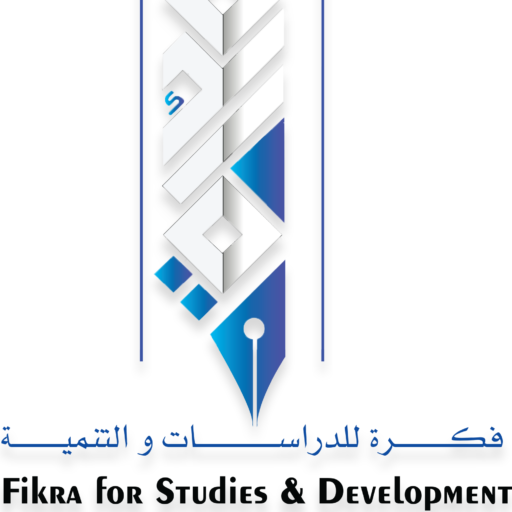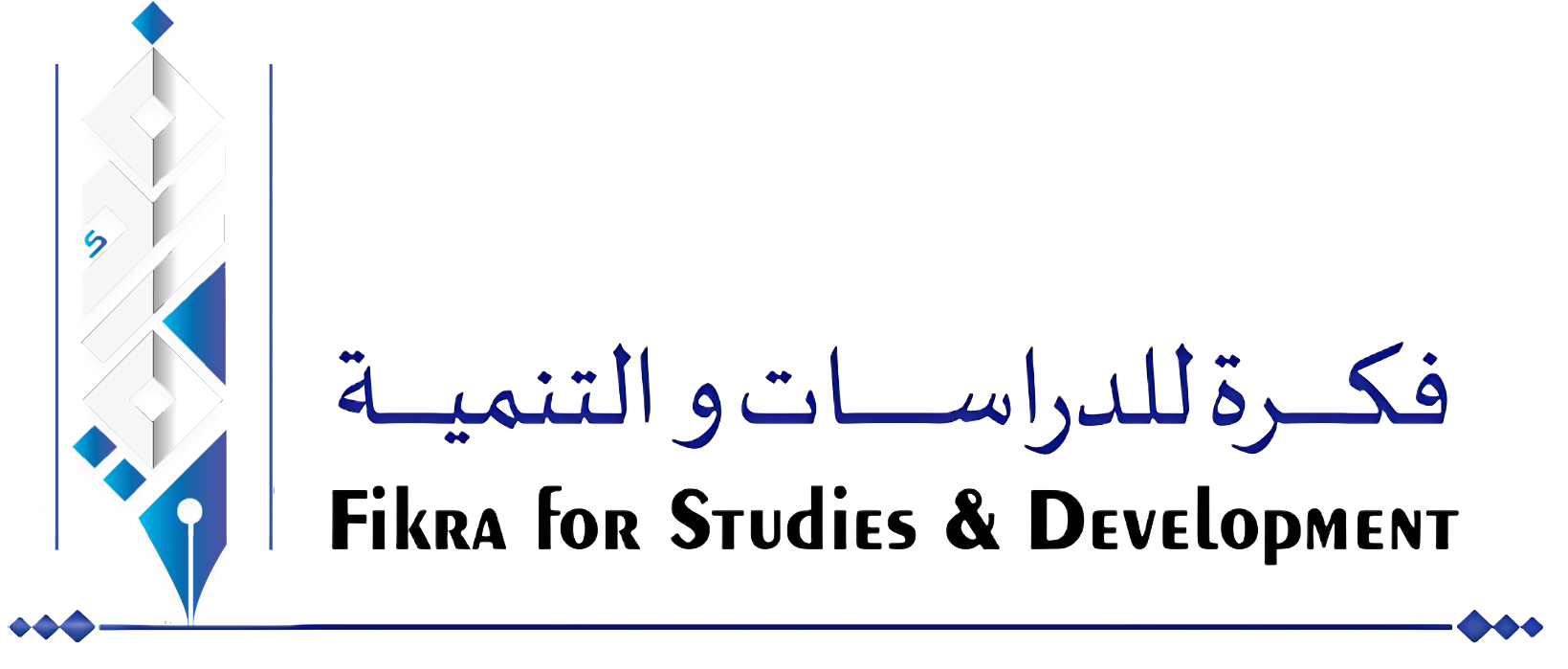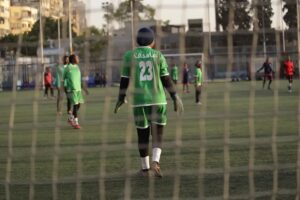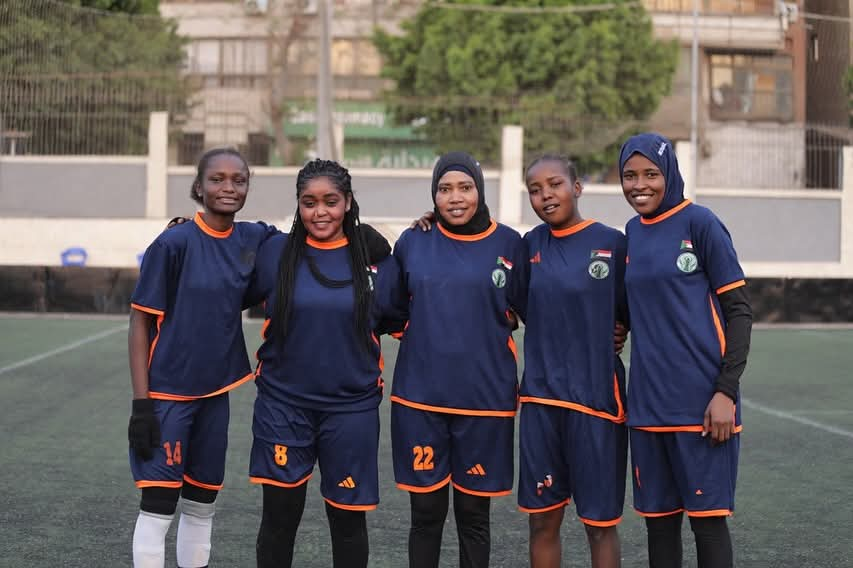Samidat: Sudanese Women Football Team
When Sport Becomes a Sanctuary for Resilience, Resistance, and Recovery
In the crucible of conflicts and wars, culture and sport stand as powerful conduits for transforming the human experience from despair to hope, from fragmentation to cohesion. January 2025 saw a poignant embodiment of this truth emerge in Cairo: Samidat “Steadfast” football team for Sudanese women. This initiative, an attempt for reconstituting a Sudanese women’s team, is more than a football team. It is formed from female footballers who sought refuge in Egypt, fleeing the devastation of the ongoing war in Sudan.
Born from a collaboration between “Fikra for Studies and Development,” “Shaleel for Sports and Arts,” and the Strategic Initiative for Women in the Horn of Africa “SIHA” network, and under the supervision of the Sudanese coach Salma Al-Majidi, the project swiftly evolved beyond its sporting framework. It became a cultural and social movement, a potent symbol of peaceful resistance and a testament to the resilience of Sudanese women in the face of extreme adversity.
Since mid-April 2023, Sudan has endured a relentless and brutal conflict, triggering what has been repeatedly described as the world’s largest displacement crisis. Millions are internally displaced, while nearly four million have fled to neighboring countries in search of safety. Egypt has become a primary haven for Sudanese refugees forced to abandon their homes.
It was against this backdrop, in January 2025, that “Samidat” team was formed. Comprising female footballers among the Sudanese refugees, the team offers a vital sanctuary—a safe space where Sudanese women can begin to heal and persevere. It represents a living symbol of strength and unwavering determination confronting formidable challenges.
Under the tutelage of coach Salma Al-Majidi, Samidat team holds regular training sessions at the Nile Club in Cairo’s Manial. Complementing these sessions, a weekly open sports day is organized, inviting all Sudanese girls and women to engage in sports. This activity serves a crucial purpose beyond physical exercise; it is framed as a form of psychological recovery, a collective balm for the wounds inflicted by war and displacement.
The history of women’s football in Sudan is not recent. It dates back to 2002. Despite significant cultural and social hurdles, the sport steadily gained traction, culminating in the launch of the first women’s football league in 2019, following the revolution that overthrew the al-Bashir regime. Subsequently, the Sudanese national women’s team was formed in 2020, led by Salma Al-Majidi. However, its activities were curtailed following the October 25, 2021 coup. Even before the current conflict, women’s teams were registered with the Sudanese Football Association, indicating a persistent if challenging presence of the sport.
The formation of Samidat team is far from a mere recreational pursuit or a way to occupy the leisure time of refugee women in Cairo. It is, at its core, an innovative and inherently resistant response to a profoundly difficult reality marked by suffering and forced alienation. To grasp the true significance of this project, one must consider the psychological, social, and political context from which it emerged. Refugee women, particularly vulnerable to the war’s repercussions and displacement, bear a heavy burden. As forced migration literature affirms, refuge is not just a change of location; it is a violent severing from the foundations of safety, stability, and identity.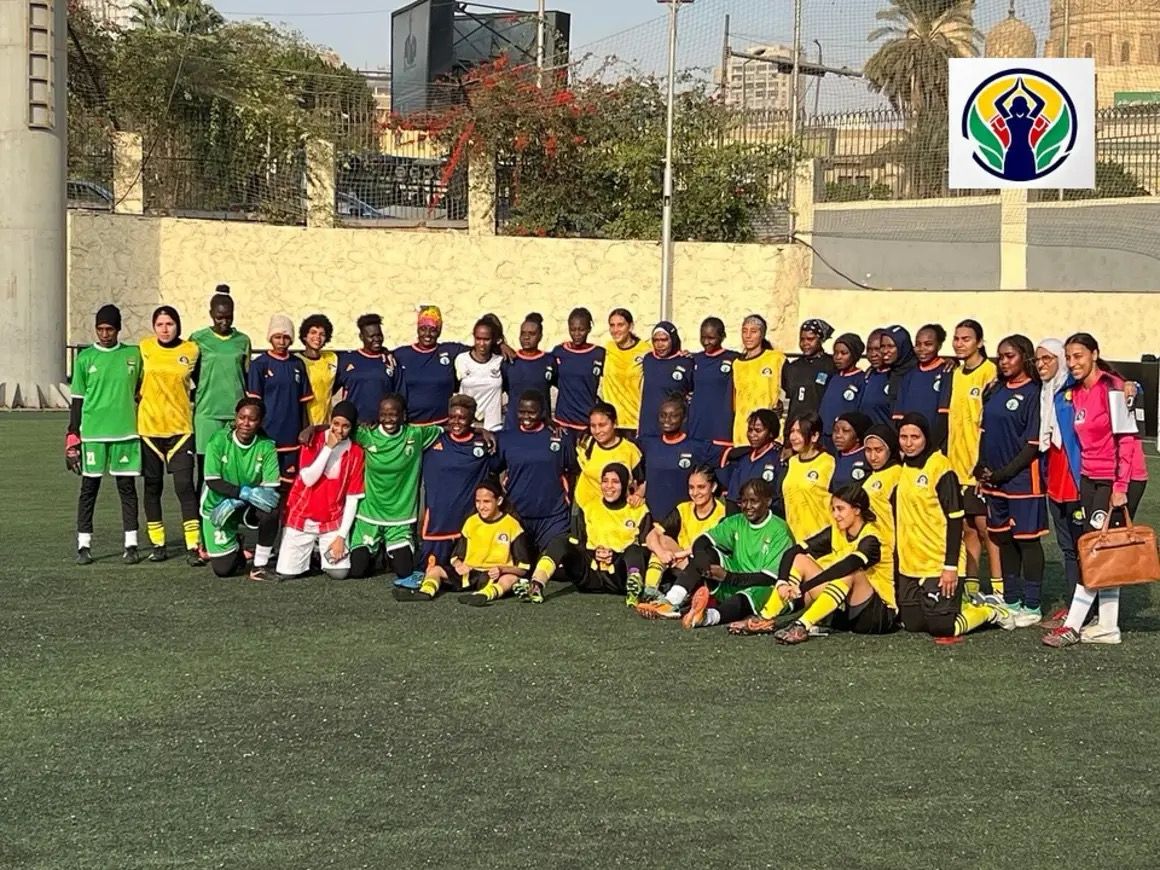
Sudanese displaced Women because of the April 2023 war carry not only the physical and familial wounds but also compounded traumas from the abrupt loss of their social environment and the collapse of both personal and national aspirations. These traumas are often exacerbated in a new setting lacking adequate institutional and social support, as is frequently reported regarding the difficult conditions faced by Sudanese refugees in Egypt.
Furthermore, the war in April 2023 triggered one of the most severe psychological and societal ruptures in Sudan’s recent history, partly due to the systematic and widespread use of sexual violence as a weapon against women and girls. This was not incidental but a deliberate tactic aimed at destroying social cohesion and humiliating communities. Its psychological impact rippled far beyond direct victims, deeply affecting Sudanese society and women particularly. Documented mass sexual violence, coupled with social stigma and painful silence, deepened feelings of helplessness, fear, and brokenness, fostering a pervasive sense of the collapse of Sudanese women’s physical and social sanctity. In a conservative society, the impact extended to millions of women who felt vulnerable and threatened by these experiences. The perpetrators sought to dismantle the image of Sudanese women as strong and resilient, replacing it with a collective state of trauma, fear, and a desperate need to reclaim selfhood and dignity.
From this perspective, Samidat team initiative transcends sport. It is a symbolic act of restoring wounded dignity, enabling a female voice to rise from victimhood to active resistance. Every training session, match, and collective moment within the team becomes a symbolic defiance against profound injustice, an attempt to rewrite the narrative of Sudanese women beyond brokenness and silence.
Sudanese refugee women face a multitude of intersecting challenges: difficulty finding work in an informal economy, high living costs versus limited income, and cultural/social barriers to integration. These factors often lead to psychological isolation and marginalization, especially for women who were active in their home communities.
Within this context, forming the women’s football team fits squarely into “therapeutic empowerment”—using communal activities like football to heal trauma and restore identity and purpose. The team offers more than physical training; it’s a safe space for self-expression, rebuilding confidence, and regaining belonging. This dimension makes the Steadfast team uniquely symbolic and humanitarian, an initiative that draws from collective pain to cultivate hope and positive resistance.
Through its open sports day, Samidat team also provides a crucial space for communal connection and healing for Sudanese women and girls in Egypt, who often experience social marginalization and psychological distress. This day, uniting professional players, refugees, and residents, is not just a sports event but a profound social act dismantling isolation and reviving community spirit. It fosters solidarity and mutual support, bridging divides created by displacement. Women sharing common pain and loss also share a dream of recovery and resistance, building trust and participation. The presence of professional players acts as a powerful role model, reinforcing the belief that recovery is possible and that returning to a full life, even excelling in it, is an attainable reality. Through physical and psychological interaction in a safe communal space, the open sports day becomes an alternative arena for healing and building new relationships based on mutual support, belonging, and active engagement, even amidst the harshness of refuge.
Samidat team is a natural extension of the Sudanese women movement, which has always been multi-faceted, blending political struggle, community work, and artistic creation. Just as Sudanese women led the December revolution with innovative tools of resistance (ululations, graffiti, grassroots initiatives), this team adds a new sporting and psychological dimension, using sport for collective empowerment and healing. It’s a link in a long chain of feminist struggles, seeing every space reclaimed from war and refuge as an opportunity to rebuild collective identity and empower women beyond passive roles towards political and social influence.
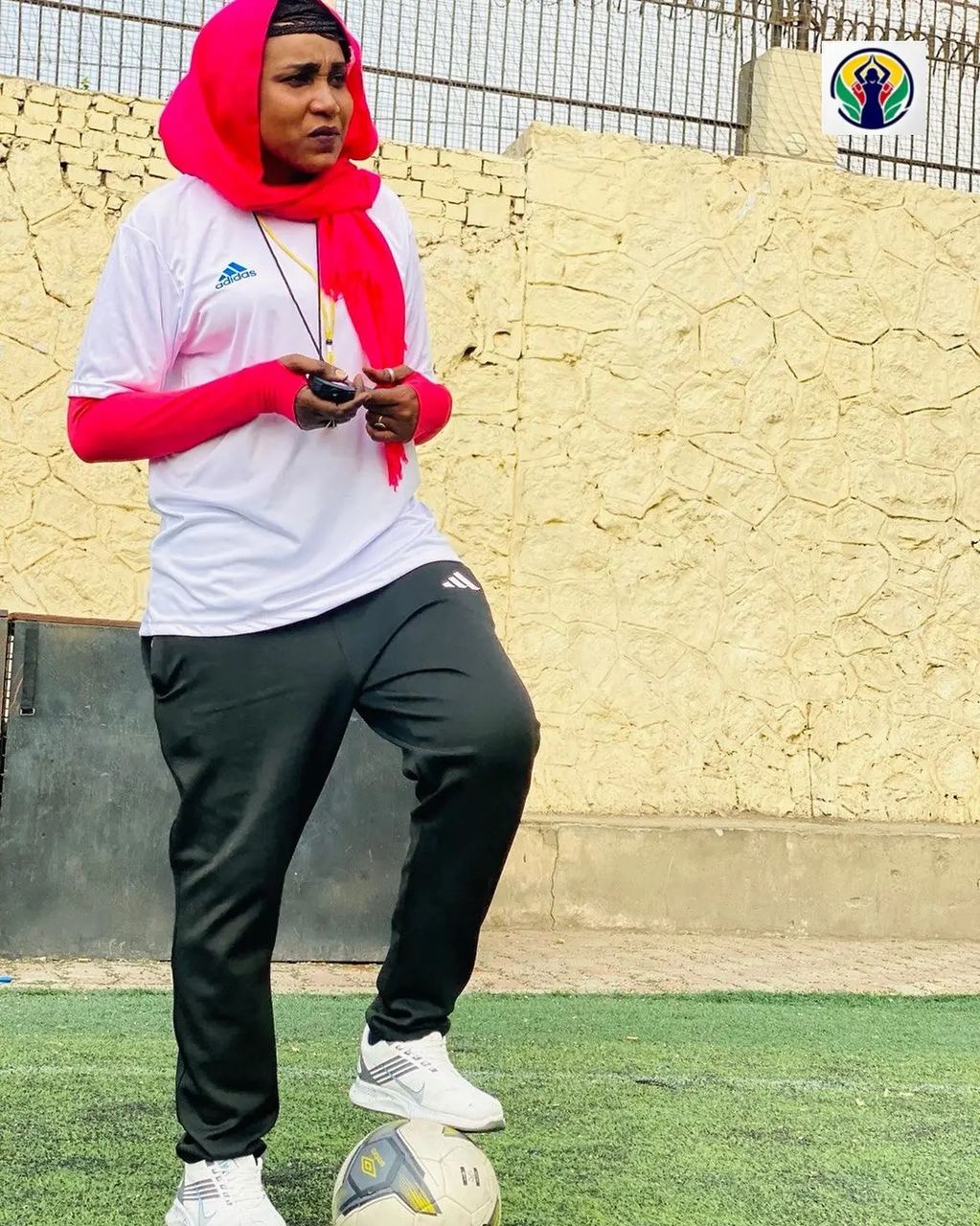
Sudanese coach Salma Al-Majidi, the director of the team, embodies this feminine resilience. Her career, marked by breaking into a male-dominated field (recognized by FIFA as the first woman in MENA to coach a men’s team), made her an icon. Her selection as one of BBC’s 100 most influential women in 2015 was global recognition of her inspiring journey. In this project, Salma adds a profound symbolic layer, not just as a coach but as a symbol of the Sudanese woman who refuses to be broken. Her success story, built against cultural and institutional obstacles, now motivates girls and women whose dreams and identities were shattered by refuge. Her experience, passion, and calm leadership provide the team with an ethical compass, turning sports into integrated psychological and social development. Salma is more than a coach; she is a witness and actor in the transformation the team seeks, representing Sudanese feminine perseverance. Her involvement with a refugee team amidst war underscores that sport is an instrument of resistance, an arena for resurrecting the will to live from the darkness of loss.
At the heart of the Steadfast project, sport transcends physical activity to become an effective tool for advocacy, drawing crucial attention to the suffering of Sudanese people, especially amidst declining international focus. The team doesn’t just play football; its public presence acts as a platform for powerful humanitarian and political messages, conveyed through the collective body and the stories of each player who endured displacement, loss, or forced migration. Every match, training session, and media appearance is an opportunity to highlight the humanitarian catastrophe in Sudan symbolically yet powerfully.
Beyond its role as a refugee sports team in Cairo, the Steadfast Against the War project serves as a powerful symbolic act reaching across borders, sending a deeply resonant message of solidarity and hope to Sudanese women and men living under the burden of war and collapse inside Sudan. At its core, the team embodies a collective reclamation of life in the face of death, offering immense psychological sustenance to those within Sudan who, watching from afar, can glimpse the possibility of resilience and feel that resistance persists, countering the rising tide of isolation, despair, and meaninglessness. Furthermore, the team functions as a form of soft diplomacy, presenting Sudan to the world from a humanitarian, feminist, and resistant perspective, providing Sudanese people, particularly women whose political voice has been diminished, a new platform through movement and presence to communicate with the world beyond images of conflict, ultimately affirming that even in exile, the Sudanese collective conscience continues to resist.
Two years into the war, when many feel the world has abandoned them, an act as simple as rebuilding a women’s football team in exile becomes imbued with political and psychological power. Solidarity here moves beyond rhetoric, becoming a living embodiment of the idea that complete defeat has not occurred, and that Sudanese people, particularly women, can transform pain into action and will. This message, seemingly sporting, carries a therapeutic dimension for the whole society, affirming that dispersal doesn’t mean severance, refuge doesn’t mean oblivion, and what Sudanese people achieve in exile is not just for survival, but a living extension of the Sudanese collective conscience that continues to resist—even without weapons—with life itself.
